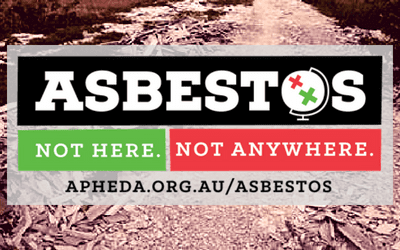The Government’s Response to Asbestos Report: the good and the bad
 Good news and bad news
Good news and bad news
In mid-August 2018, the Government released their response to the interim report on protecting Australians from the threat of asbestos. It’s good news that the Australian Government wants to continue to play a role in our region and more broadly in achieving asbestos bans and increased awareness of the dangers of asbestos. However it is bad news that the Government didn’t support an increased testing regime, compulsory recalls of illegally imported asbestos products, an education program for importers on Australia’s asbestos ban or increasing penalties for importers. Illegal asbestos imports are stopped at our border every week. We know that asbestos containing materials are making their way into our communities and workplaces – more needs to be done to make sure importers understand Australia’s asbestos ban and take it seriously. Strong regulations in Australia and support from the Australian Government doesn’t just protect our communities, it also strengthens the campaign for bans overseas.
Many of the recommendations relating to increasing coordination or new regulations on illegal asbestos imports were noted or not supported by the Government. The Government didn’t support increased testing or recall protocols for illegal asbestos imports. Hundreds of people supported our petition for the Government to support the recommendations, but in the Government response they only supported (or partly supported) seven of the 26 recommendations.
We’ll let you know how you can support the next steps in pressuring this Government to follow through on its commitment to international leadership and protecting Australians from the threat of asbestos imports.
So what are the results?
The Government Supported:
- Funding for the Asbestos Safety and Eradication Agency (ASEA)
- Supporting the listing of Chrysotile Asbestos on Annex III of the Rotterdam Convention
- Supporting asbestos bans internationally and increasing awareness of the risks of asbestos in the Asia-Pacific region
- PARTLY SUPPORTED mandatory asbestos awareness training for occupation in the construction industry but believe that existing training is enough.
- A one stop shop website run by ASEA for information on illegal asbestos imports.
- Examination of European Union regulations to see if Australia can improve systems.
- PARTLY SUPPORTED Developing nationally consistent legal obligations on the removal and/or disposal of illegally imported asbestos but the Government believes that the existing regulations and reviews are sufficient.
The Government didn’t support:
- Having a specialist unit within Border Force to manage illegal asbestos imports
- Prioritising prosecution of illegal asbestos import cases
- Mandatory testing for ‘high risk’ goods by an accredited authority prior to import
- Compulsory recalls for products containing illegally imported asbestos, except where there are significant risks associated with the recall.
- Directing the ACCC to provide a statement of reasons if they decide not to issue a compulsory recall of illegally imported asbestos products.
- Considering the merits of requiring importers and suppliers to hold recall insurance for potential asbestos containing materials.
The government ‘noted’ the recommendations:
- To pursue a whole of government approach to strengthening legislation and regulations to address illegal imports of asbestos at a state and federal level.
- To have an external review of their industry consultation processes and regular formal meetings with those on the front line being impacted by illegal asbestos importation.
- If Australia and other countries fail to achieve the listing of chrysotile asbestos in Annex III of the 2019 Rotterdam Convention the Australian Government should pursue an alternative treaty.
- In the course of reviewing Free Trade Agreements that the Australian Government should include provisions on asbestos containing materials.
- For the Department of Immigration and Border Protection and Border Force to consider developing an education campaign for importers on the risks and responsibilities regarding asbestos containing materials.
- The Border Force reviews its staff resourcing to manage illegal asbestos imports.
- That the Australian Government review the Customs Act 1901 and other legislation to close loopholes and potentially increase the threshold of when ‘mistake of fact’ can be used.
- The there is a review of the penalties for breaches of the import ban.
- Increasing requirements and due-diligence for ‘high risk products’.
- Other states and territories should consider passing similar legislation to Queensland’s Building and Construction Legislation (Non-Conforming Building Products – Chain of Responsibility and Other Matters) Amendment Act 2017.
- The Government should review and clarify the role of the Federal Safety Commissioner in relation to asbestos containing materials.
- That the ACCC should review the public reporting of asbestos containing materials in consumer products and the monitoring and reporting of incidents over time.
- That the Australian Government established a national public asbestos register.
You can download the whole response here if you would like to read it in more detail.